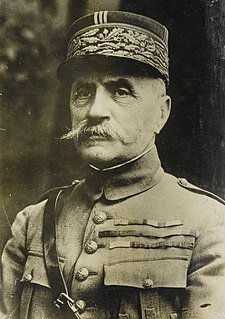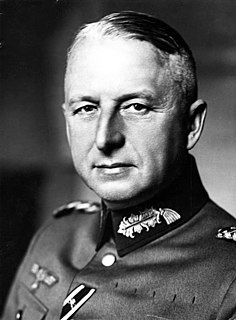A Quote by James Keller
In one of the decisive battles of World War I, disastrous reports poured into the headquarters of Marshal Foch, the commander of the Allied forces. The great general never lost heart. When things were at their worst, he drafted his famous order which is now in all textbooks of military strategy: "My center is giving way, my right is pushed back, my left is wavering. The situation is excellent. I shall attack!"
Quote Topics
Allied
Attack
Back
Battles
Center
Commander
Decisive
Disastrous
Drafted
Excellent
Famous
Forces
General
Giving
Giving Way
Great
Headquarters
Heart
His
Left
Lost
Lost Heart
Marshal
Military
Military Strategy
Never
Now
Order
Pushed
Reports
Right
Shall
Situation
Strategy
Textbooks
Things
War
Wavering
Way
Were
Which
World
World War
World War I
Worst
Related Quotes
The general verdict among the German generals I interrogated in 1945 was that Field-Marshal von Manstein had proved the ablest commander in their Army, and the man they had most desired to become its Commander-in-Chief. It is very clear that he had a superb sense of operational possibilities and equal mastery in the conduct of operations, together with a greater grasp of the potentialities of mechanized forces than any other commander who had not been trained in the tank arm. In sum, he had military genius.
The United States, as the world knows, will never start a war. We do not want a war. We do not now expect a war. This generation of Americans has already had enough - more than enough - of war and hate and oppression. We shall be prepared if others wish it. We shall be alert to try to stop it. But we shall also do our part to build a world of peace where the weak are safe and the strong are just. We are not helpless before that task or hopeless of its success. Confident and unafraid, we labor on - not toward a strategy of annihilation but toward a strategy of peace.
The war against Iraq is as disastrous as it is unnecessary; perhaps in terms of its wisdom, purpose and motives, the worst war in American history... Our military men and women...were not called to defend America but rather to attack Iraq. They were not called to die for, but rather to kill for, their country. What more unpatriotic thing could we have asked of our sons and daughters...?
This writer, who is horribly perspicacious and vigorous, demonstrates the certainty of a great European war, and regards it with the peculiar satisfaction excited by such things in a certain order of mind. His phrases about "dire calamity" and so on mean nothing; the whole tenor of his writing proves that he represents, and consciously, one of the forces which go to bring war about; his part in the business is a fluent irresponsibility, which casts scorn on all who reluct at the "inevitable." Persistent prophecy is a familiar way of assuring the event.
It [9/11 event] was aimed at symbols: the World Trade Center, the heart of American capitalism, and the Pentagon, the headquarters of the American military establishment. But it was not meant to be argued with. It wasn't part of any negotiation. No message was intended with it. It spoke for itself, which is unusual.
I think the single most important political distinction today is actually between open-minded versus closed-minded, and that's why I think this crosses the boundaries of traditional - center-right and center-left have much more in common with each other right now than the right does with the center-right, and the left does with the center-left.
A commander-in-chief cannot take as an excuse for his mistakes in warfare an order given by his sovereign or his minister when the person giving the order is absent from the field of operations and is imperfectly aware or wholly unaware of the latest state of affairs. It follows that any commander-in-chief who undertakes to carry out a plan which he considers defective is at fault; he must put forward his reasons, insist on the plan being changed, and finally tender his resignation rather than be the instrument of his army's downfall.
I thought you were supposed to be the champion of your people,' I said. I live because I need to do that. For anyone who is left.' Don't you see? No one will be left. Protect them now or there will be no one to protect!' This is a battle that goes on and on. It never ends. You're too young to understand. No! You're too much of a coward to fight.' I was sick of lies and secrets and of battles so old we had to erase who we were to fight back. And still we lost. Still we were tied to posts.





































